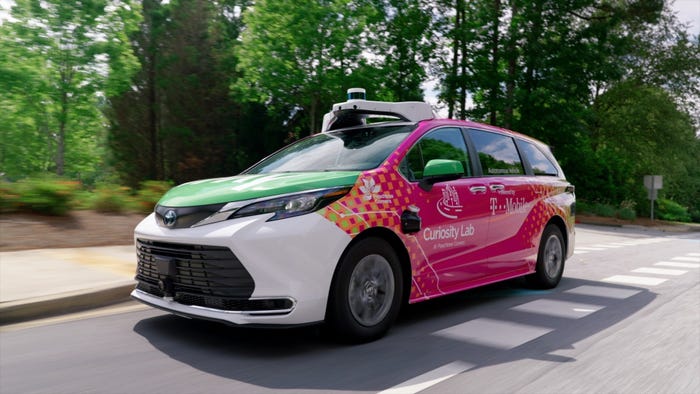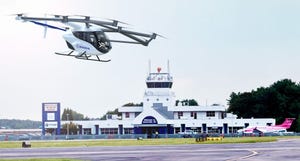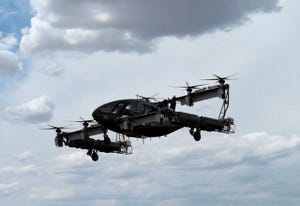Most Read This Week: Flying Taxi Service Planned for Miami, Toyota Ransomware Attack Compromises Personal Data
Also inside, Uber Freight set to accelerate self-driving truck development and more
.png?width=1280&auto=webp&quality=95&format=jpg&disable=upscale)
Here are IoT World Today’s most read stories this week:
Flying Taxi Service Planned for Miami, South Florida
An electric aerial vehicle (EAV) maker and a Miami-based airline company are set to launch eVTOL (electric vertical takeoff and landing) commuter flights throughout South Florida.
Eve Air Mobility and UrbanX Air in Miami will establish the framework for launching EAV flights by 2026, with the first 10 Eve eVTOLs expected to be delivered in 2026.
Johann Bordais, CEO of Eve Air Mobility, said the project will “change the way people commute and travel in South Florida.”
The electric flying service in Florida is subject to approvals from the Federal Aviation Administration (FAA) and the Department of Transportation.
Find out more about the project >>>
Toyota Ransomware Attack Compromised Personal Data
A ransomware attack against Toyota Financial Services (TFS) reported earlier this month is ongoing, with German customers reportedly being told their data has been compromised.
Toyota Kreditbank GmbH in Germany also confirmed it was one of the impacted divisions, announcing it had detected “unauthorized activity” on systems.
The company first announced it had identified unauthorized access on its systems in Europe and Africa in November, following a claim from ransomware group Medusa that it had gained access to TFS’ systems.
The group gave the company 10 days to pay an $8 million ransom.
Now, German news outlet Heise said it received copies of letters sent to German customers informing them their data had been compromised, including their name, address, IBAN and contact details.
Read more about the attack here >>>
Flying Taxi Takes off in Japan; Readied for World Expo
A German eVTOL (electric vertical takeoff and landing) vehicle developer has completed several days of crewed test flights in Japan.
The VoloCity air taxi from Volocopter was flown in the cities of Osaka and Amagasaki over the course of a week in preparation for the 2025 World Exposition, Osaka Kansai Expo.
Volocopter said the flights were to test electric aerial vehicle (EAV) operations under conditions like what is expected during the Expo and to accelerate public awareness of eVTOL vehicles in Japan.
The final flight test day event was co-hosted by Sumitomo Corporation, Volocopter’s strategic partner and investor in Japan.
See footage of the test flights here >>>
Flying Taxi Company Teams With Lufthansa
Lilium, a developer of an eVTOL jet, is partnering with the Lufthansa Group to explore EAV opportunities in Europe.
The partners said they signed a memorandum of understanding to identify opportunities in aviation including ground and flight operations, EAV maintenance and flight training.
The companies also said they plan to analyze collaboration with third parties such as airports and regional partners for vertiports, airspace integration and to define operational processes.
Detlef Kayser, member of Lufthansa Group’s Executive Board, said the partners want to “drive the transformation of the industry” with the initiative.
Lufthansa said it is pursuing a fleet strategy aimed at cost-efficiency and reduced emissions, with the goal of cutting net carbon emissions in half by 2030.
Uber Freight, Torc to Accelerate Self-Driving Truck Development
Torc Robotics and Uber Freight are collaborating to develop autonomous trucks.
Under the terms of the agreement, Torc Robotics will leverage Uber Freight’s logistics network to guide the future deployment of its self-driving heavy goods vehicles, incorporating its self-driving tech that includes cameras, lidar, radar and high-definition mapping.
Uber Freight’s network, which connects trucks with shippers, is among the most comprehensive in the world, representing $18 billion in active freight under management and with more than 100,000 digitally enabled carriers.
According to Torc, insights from Uber Freight will be used to inform how it builds its autonomous freight network in the most commercially viable way.
Areas of particular interest will be how to choose the optimal lanes for deployment; how to prioritize the order of rollout; and how to manage loads on autonomous trucks via transfer hubs.
About the Author
You May Also Like








